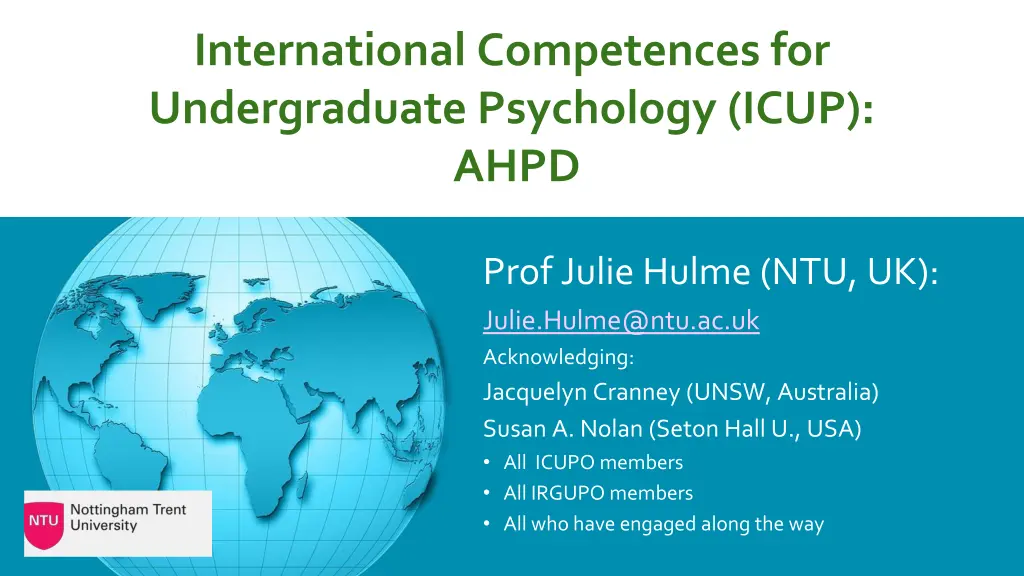
International Collaboration on Foundational Psychology Competences
Explore the International Collaboration on Undergraduate Psychology Outcomes (ICUPO) led by Prof. Julie Hulme, focusing on the development of foundational psychology competences at the undergraduate level. Discover the aims, rationale, and importance of creating an international model for psychology education that adapts to local contexts. Acknowledging key contributors, this initiative aims to address the diverse career paths and societal needs within the field of psychology.
Download Presentation

Please find below an Image/Link to download the presentation.
The content on the website is provided AS IS for your information and personal use only. It may not be sold, licensed, or shared on other websites without obtaining consent from the author. If you encounter any issues during the download, it is possible that the publisher has removed the file from their server.
You are allowed to download the files provided on this website for personal or commercial use, subject to the condition that they are used lawfully. All files are the property of their respective owners.
The content on the website is provided AS IS for your information and personal use only. It may not be sold, licensed, or shared on other websites without obtaining consent from the author.
E N D
Presentation Transcript
International Competences for Undergraduate Psychology (ICUP): AHPD Prof Julie Hulme (NTU, UK): Julie.Hulme@ntu.ac.uk Acknowledging: Jacquelyn Cranney (UNSW, Australia) Susan A. Nolan (Seton Hall U., USA) All ICUPO members All IRGUPO members All who have engaged along the way
OVERVIEW Introduction to ICUPO and ICUP Relevance to UK UG psychology Further discussion and questions
Links to all information ICUPO information ICUP pre-print Citation: Nolan, S. A., Cranney, J., Narciss, S., Machin, T., Gullifer, J., Goedeke, S., de Souza, L. K., Job, R., Jia, F., Foster, L., Hulme, J., Iliescu, D., Ju, X., Kojima, H., Kumar, A., Tchombe, T., Waitoki, M., & IRGUPO.1 (in prep). Beta.R1 Version: International Competences for Undergraduate Psychology (ICUP). Preprint available at osf.io/6y38x/1 3
ICUPO International Collaboration on Undergraduate Psychology Outcomes Rationale: Growing number of psychology programs worldwide (mobility, communication) a. International professional psychology competences exist (IPCP, 2016), but not undergraduate/foundational b. Multiple stakeholders, given diverse careers & potential community impact c. Consideration of current/future societal needs (Campion et al., 2011; Narciss & Zumbach, 2022) d. Note national differences in: (1) aims* of UG programs; (2) % who become psychologists; (3) existence of national psychology-specific regulation; (4) national needs/contexts. Cranney, Dunn, Hulme, Nolan, Morris, & Norris (2022) 4
International Collaboration on UG Psychology Outcomes Aims: collaboratively create an international foundational psychology competence model for UG level a. encourage/support adaptation to local/national contexts: Guidance only b. seek support for Model from international & national psychology organisations and education leaders. c.
Foundational psychology competences Foundational psychology competence: A specific behaviour or set of behaviours performed to a standard, within personal, work or community contexts; these behaviours are underpinned by practical and theoretical knowledge, cognitive skills, attitudes and values. A foundational level of competence indicates that graduates will have broad and coherent knowledge and skills that can be further developed as professional psychology competences in advanced UG or graduate programs. (Nolan et al., in prep; osf.io/6y38x/)
Method: Structures/Processes ICUPO Committee 17 members, 13 countries monthly ICUPO meetings (Oct 2022->); 4 x working groups+ IRGUPO reference/advisory group 101 members, 39 countries Overall: 118 members from 41 countries multiple inclusivity & communication strategies 4 x structured consultations with IRGUPO several revisions of model since June 2023 general approach: Consensus seeking + iterative stakeholder consultation For more detail, see osf.io/6y38x/
Psychological Literacy (PL) & Global Citizenship (GC) QAA SBS 2.4 Psychology courses which draw on research literature and professional practice help to guide the psychological literacy of graduates who develop confidence in addressing their personal, professional and community goals. The possession and application of such skill and knowledge are much sought after by future employers and society, locally and globally. In addition, an understanding of psychological literacy is of great value to graduates' self-awareness and personal development over their lifespan. Nolan et al. (in prep; preprint at osf.io/6y38x/) Psychological Literacy is the intentional application of psychological knowledge, skills and values to achieve personal, work and community (local to global) goals. The integration and application of foundational psychology competences within an [undergraduate] program should lead to psychologically literate graduates (p.14) Cranney et al. (2012.p.iii): Global citizenship (GC) is the understanding of global interrelatedness, and the capacity to live, work and contribute positively as a member of global communities
Some contexts/frameworks influencing develop. of ICUP Global Educational Frameworks (eg OECD) 27+ National psychology outcome models (including UK QAA SBS 2023) Global human behavioral goals (eg UN SDG) Cultural Responsiveness (CR) & Positionality CR perspectives from eg Aotearoa New Zealand; India; Brazil; UK; Cameroon Psychological Literacy & Global Citizenship
International Competences for Undergraduate Psychology (ICUP) [Beta.R1 Version; Nolan et al., in prep; osf.io/6y38x/] Psychological Knowledge Psychological Research Methods & Methodologies Psychology-relevant Values & Ethics Critical Thinking & Problem Solving Cultural responsiveness & Diversity Communication & Interpersonal Skills Personal & Professional Development
Psychological Knowledge 1. Evaluate the fundamental concepts, theories, principles, methodologies and methods of psychology, including acknowledgement of multiple ways of knowing (e.g., Western, Non- Western, Indigenous). Critically reflect on the history and current context of the discipline of psychology and its philosophical, social-cultural, historical, and geopolitical influences. Identify the distinctive contribution of the discipline of psychology in relation to other disciplines to understanding the self, others, and contemporary contexts. QAA SBS 2.2: Courses are designed to provide an understanding of both historical and contemporary psychological theories and research, and to prepare students for the application of psychological knowledge and skills to future issues. Historical and contemporary viewpoints will be integrated throughout the design of a course and represent culturally diverse perspectives. 2. 3.
Psychological Research Methodologies & Methods 1. Evaluate the benefits and limitations of the different methodologies, paradigms and core methods of psychological research. 2. Identify and formulate research questions; select appropriate and rigorous methods; gather and analyse data; interpret and evaluate findings relevant to the methods used, and communicate all aspects of this research process. 3. Evaluate the integrity of psychological research in terms of ethical considerations, the influence of personal and social- cultural factors, and the cultural and social appropriateness and impact of the research. QAA SBS 3.6, 3.7, 3.8, 3.9, 3.10, 3.11 quantitative and qualitative research methods, data collection, ethics and social responsibility, reporting
Psychology-relevant Values & Ethics QAA SBS 2.5: At the core of the discipline is ethical understanding and ethical behaviour and this is often at the heart of course design. For example, there will be a range of activities that will facilitate the comprehensive application of ethics in research, professional practice and everyday conduct. Students will be able to apply this to their own ethical behaviour as well as critically evaluating the ethical behaviour of others. 1. Demonstrate ongoing reflexivity regarding personal values and biases and their developmental, social-cultural and contextual influences. 2. Evaluate the ethical and legal principles and values of professional codes of conduct relevant to psychological research and practice. 3. Evaluate complex moral and ethical dilemmas and apply psychology-informed ethical decision- making in diverse cultural contexts.
Psychology-relevant Cultural Responsiveness & Diversity 1. Demonstrate reflexivity regarding the impact of one s own and others historical, social-cultural, and geopolitical contexts and roots in understanding self and others on an ongoing basis. 2. Demonstrate cultural responsiveness and humility, that is, behaviour that is respectful, compassionate, culturally appropriate, and sensitive in relation to individuals, groups, and communities from diverse cultural and personal backgrounds. 3. Propose, implement and/or evaluate interventions based on psychological science to meet the needs of diverse cultural groups including historically marginalised groups. QAA SBS 1.20 (and EDI section generally): Psychology degree programmes create an inclusive and supportive learning environment that encourages openness and values diversity - for example, regarding differing cultural backgrounds. Course content emphasises critical thinking, ethics, evidence- based decision making, and collaboration across interdisciplinary fields. Programme objectives foster self-awareness, emotional intelligence, and communicative effectiveness, ultimately preparing individuals to become informed citizens who engage thoughtfully with society at large.
Psychology-relevant Critical Thinking & Problem Solving 1. Evaluate claims by considering source credibility and validity, the potential for bias, and evidence of multiple perspectives. QAA SBS 3.16 (subject specific skills): integrate ideas and findings across multiple perspectives and approaches in psychology and apply psychological knowledge ethically, professionally and safely to real-world problems; apply critical-thinking skills to address complex problems to identifying creative and innovative solutions 2. Apply problem-solving to generate ideas to address psychological challenges. 3. Form and justify judgements and decisions based on psychological knowledge, skills and values. 4. Propose, implement, and/or evaluate interventions to promote critical thinking and creative problem-solving.
Psychology-relevant Communication & Interpersonal Skills 1. Demonstrate foundational communication and collaboration skills using a variety of formats to communicate psychological principles and research findings to diverse audiences. 2. Demonstrate teamwork skills that promote understanding, inclusivity, and cooperation among team members. 3. Demonstrate appropriate and ethical use of digital technology to facilitate communication and collaboration using a variety of communicative formats. QAA SBS 3.17 (transferable skills): communicate effectively using a range of verbal and/or non-verbal methods; interact professionally with others, respond inclusively in a manner sensitive to the needs and expectations of a diverse range of audiences; demonstrate digital literacy through the use of online databases and analytic software, and digital approaches to personal and professional development
Psychology-relevant Personal & Professional Development 1. Demonstrate ongoing reflexivity regarding one s competences, values, and interactions with others to enhance self-care and the self-regulation of thoughts, feelings, and behaviours. 2. Seeks advice appropriately from experts/mentors/supervisors when experiencing limitations in judgment or competence. 3. Identify one s career aspirations and requirements and implement a career development plan. 4. Propose, implement and/or evaluate interventions to address psychological challenges in workplace contexts. 5. Propose, implement, and/or evaluate interventions to meet the psychological needs of communities (local to global), with reference to the United Nations (UN) Sustainable Development Goals (SDGs), such as eliminating racism and human habitat destruction. QAA SBS Sections 1.28-1.32 (sustainability); sections 1.33-1.35 (enterprise and entrepreneurship),
Next Steps 1. Organisational feedback cycle 1: due Feb 28 [Beta.R1] 2. Organisational feedback cycle 2: due May 7 [Beta.R2] 3. Endorsement/support response: due June 15 [Gamma?] 4. ICP July 2024 symposium and consensus discussion 5. Finalisation of ICUP 6. Continuous dissemination and building/sharing of resources 7. Revision every 5-10 years
Our Feedback Questions for you We are in the process of revising the Model based on national and international feedback. Does AHPD have any suggestions for change to this Model, keeping in mind that the ICUP Model s competences are to be (i) conceptually, generally applicable internationally, and (ii) used as a guide (only) for creation or revision of UG psychology programs in national/regional/institutional contexts? Does AHPD have any comments on the strengths of, and opportunities with, the ICUP Model? Does AHPD have any comments regarding challenges and possible solutions with this Model? How satisfied is your organisation with the current version of the ICUP model, in terms of recommending it as a model to guide UG program creation/revision in your nation? (0 = very dissatisfied, 4 = neither dissatisfied nor satisfied; 7 = very satisfied) And: Procedure for endorsement/support?
International Collaboration on Undergraduate Psychology Outcomes: AHPD Meeting Questions & Discussion
Some references/resources Australian Psychology Accreditation Council (2022). Annexure to the APAC evidence guide: Standard 3 Program of study, Criterion 3.8. https://apac.au/wp-content/uploads/2022/12/Criterion-3.8-guidance-document_v1.1-final.pdf Campion, M. A., Fink, A. A., Ruggeberg, B. J., Carr, L., Phillips, G. M., & Odman, R. B. (2011). Doing competencies well: Best practices in competency modeling. Personnel Psychology, 64(1), 225 262. https://doi.org/10.1111/j.1744-6570.2010.01207.x Cranney, J., Botwood, L, & Morris, S. (2012). National standards for psychological literacy and global citizenship: Outcomes of undergraduate psychology education. Final peer-reviewed report of ALTC/OLT National Teaching Fellowship. Retrieved from https://groups.psychology.org.au/Assets/Files/Cranney_NTF_Final_Report_231112_Final_pdf.pdf International Project on Competence in Psychology (2016). International declaration on core competencies in professional psychology. https://www.iupsys.net/wp-content/uploads/2021/09/the-international-declaration-on-core-competences-in-professional-psychology- 1.pdf Narciss, S., & Zumbach, R. G. (2022). Psychology in teacher education. In J. Zumbach, D. Bernstein, S. Narciss, & P. Marsido (Eds.), International handbook of psychology learning and teaching (pp.807-846). Springer Nolan, S. A., Cranney, J., Narciss, S., Machin, T., Gullifer, J., Goedeke, S., de Souza, L. K., Job, R., Jia, F., Foster, L., Hulme, J., Iliescu, D., Ju, X., Kojima, H., Kumar, A., Tchombe, T., Waitoki, M., & IRGUPO.1 (in prep). Beta.R1 Version: International Undergraduate Foundational Psychology Competences. Preprint available at osf.io/6y38x/ United Nations Department of Global Communications (2023). Sustainable development goals: Guidelines for the use of the SDG logo including the colour wheel, and 17 icons. https://www.un.org/sustainabledevelopment/wp- content/uploads/2019/01/SDG_Guidelines_AUG_2019_Final.pdf University of British Columbia (UBC). (n.d.). Positionality and intersectionality. https://indigenousinitiatives.ctlt.ubc.ca/classroom- climate/positionality-and-intersectionality/ 21




